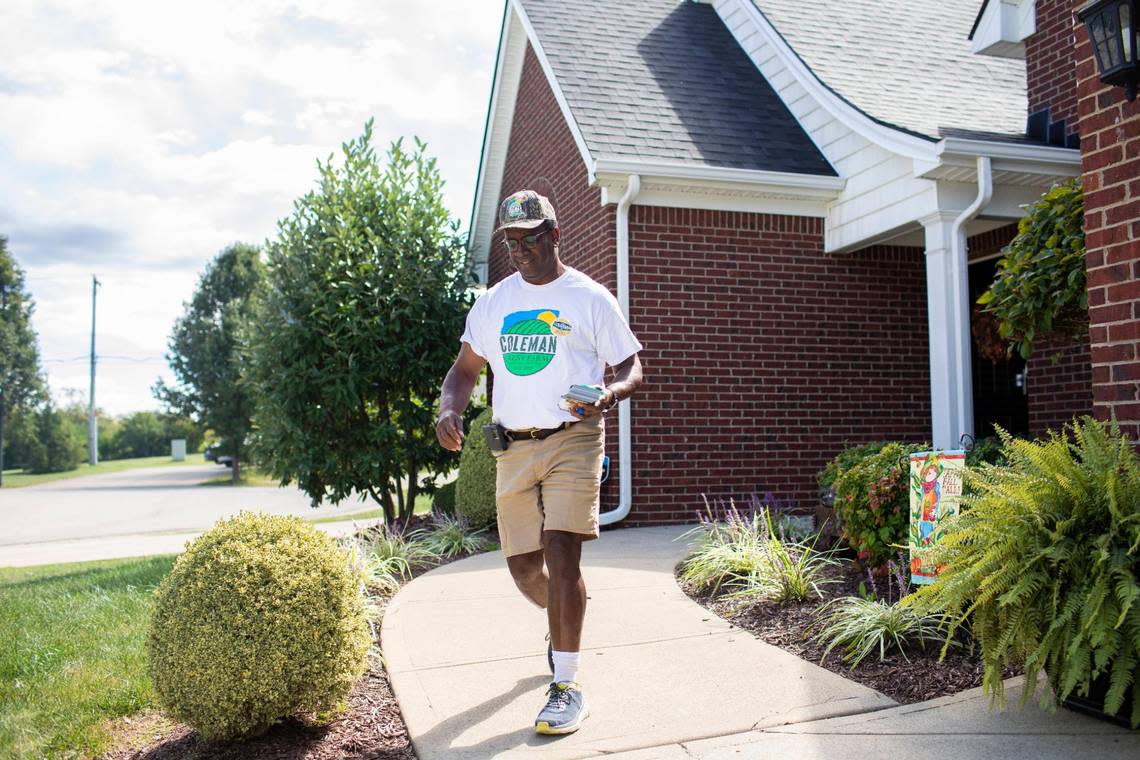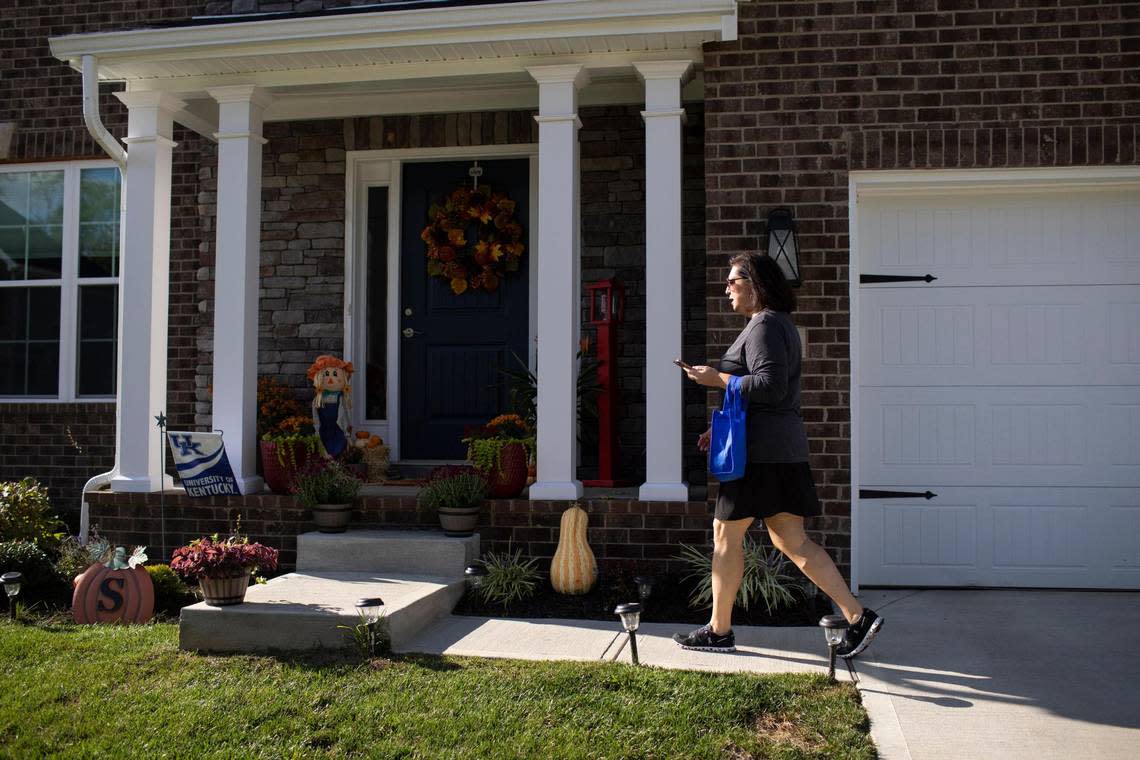Battle in Lexington-based House District could tell us a lot about KY’s political future
If history is any indication, Lexington Rep. Cherlynn Stevenson’s, D-Lexington, race against Republican opponent Jim Coleman will be a close one.
Stevenson gained her 88th state House district seat by a thread – 48 votes, to be exact – in 2018, and she weathered a red wave in 2020 winning by about three percentage points.
But that was in her old district. The new 88th got shifted significantly to an almost entirely new section of Fayette County, and now includes parts of Republican-friendly Scott County. In previous contests, allies say Stevenson’s impressive campaign hustle and constituent outreach have helped her hold onto the seat.
Jim Coleman, however, is a different kind of opponent.
“Jim Coleman is a dream candidate and an absolute recruiting masterpiece for Republicans. I wish we had more candidates like him,” Senate Majority Leader Damon Thayer, R-Georgetown, said.
Coleman’s resume is long and strong. He is a former Wall Street executive, who also led economic development efforts for counties with more than twice the population of Fayette, and he claims close relationships with the state’s Republican elite.
All that, and he’s got as compelling of a Lexington origin story as you’ll find.
He returned to Coleman Crest farm after a long absence from Lexington two years ago. The namesake farm is the inheritance of his formerly enslaved great-grandparents who bought the original East Fayette County parcel, where they were forced to work as slaves, in 1888. His father made him farm manager there when he was only 12 years old, and now – after a top-flight business career with stops on Wall Street and Silicon Valley – Coleman says he has re-grown the farm into a thriving business.
Before he even started running for anything, that story alone scored him celebratory profiles in local outlets.
Thayer and the rest of the GOP in Scott County – he along with Georgetown native, 2023 gubernatorial candidate and Commissioner of Agriculture Ryan Quarles hosted a fundraiser for Coleman this summer – is betting that Coleman’s story, as evidenced by his door-knocking strategy, will help win over voters in the decidedly purple House District and further entrench the GOP’s hold over the House where it touts a 75-25 advantage over Democrats. When approaching households that aren’t entirely Republican on a Saturday earlier this month, the first words out of Coleman’s mouth were most often about his ancestral farm.
Another factor that may play in Coleman’s favor: the new map. It retains a small chunk of Lexington outskirt neighborhoods in between Richmond Road and Winchester Road, but everything else is new. It used to center around Southern Fayette County, but now outlines much of the city’s Eastern and Northern suburbs and includes a chunk of Republican-friendly Scott County. Republicans outnumber Democrats there 16,874 to 15,259, per Coleman’s numbers.
Former president Donald Trump won the district by about five percentage points, while Gov. Andy Beshear carried both Scott and Fayette County portions by a total of 15 percentage points, according to Stevenson.
Meanwhile, Stevenson’s record as a campaign trail hustler as well as a responsive and personable politician lends her camp – and those in Lexington’s Democratic circles – confidence about this year.
“What she’s going through this time is no different than what she’s been through time and time again, and she’s come out victorious in all those endeavors,” said Chad Aull, representative-elect for Lexington’s 79th district. “And nobody – absolutely, period nobody – is going to outwork her.”
Stevenson has a group of dedicated, grassroots supporters who’ve been with her since her first election – that includes a core group of former teachers who latched onto her first campaign during the teacher protests of 2018 and are still beating the bushes this cycle.
She works the door-knocking trail like her record would suggest: personable, with some personal touches added. She leaves hand-written notes with her phone number in every door, and dog treats for any furry friends she spots.
Retiring representative Susan Westrom, D-Lexington, said that Stevenson works harder than almost anyone in Frankfort, on the trail and in the Capitol.
“She’s the one person I can rely on to be here as early and as late as I am,” Westrom said. “For her, it’s like breathing. It’s what she was meant to do.”
Democrats also argue that the expanded relevance of abortion helps them. In Kentucky, abortion is currently banned following the U.S. Supreme Court’s overturning of landmark abortion rights case Roe v. Wade. The law is currently being challenged in the Kentucky Supreme Court, and Kentucky voters will get the opportunity to render the opinion of courts moot if they vote this year for an anti- constitutional amendment
The strength of both candidates has some observers guessing that the direction of this purple district could be one of the best indicators of how the state is trending politically.


“You cannot overwhelm the overwhelming.”
Rep. Jason Nemes, R-Louisville, has a simple pitch for why suburban districts near Democratic hubs, like his in Louisville or the new 88th, should vote Republican in state legislative elections: you get a seat at the table.
The vast majority of bills passed in recent sessions have been sponsored by Republicans. Priority bills for both social and fiscal conservatives – a major income tax cut plan just the same as a bill severely restricting access to abortion – have sailed through the legislative process without the need for any Democratic support.
“It’s no secret that decisions are made in the majority caucus room,” Nemes said. “In Louisville, or if I were a Lexingtonian, I would want my representative to have a seat at the table – in the language of the Hamilton play ‘in the room where it happens.’”
Like some other Democrats who have only served after they lost their House majority in 2016, Stevenson has not seen any of the several bills on which she’s primary sponsor pass.
By the same token, Democrats have increased access to Beshear as long as he’s heading the state’s executive branch. And Beshear has become something of a North Star for candidates like Stevenson trying to win in areas that don’t just automatically vote blue – for Stevenson, the political takeaway is mainly about the success of Beshear’s Mr. Rodgers-esque personality.
“I think he is really great at talking to people and being genuinely interested and concerned for them. He just comes across as a really genuine person, and I think that people are looking for that. We’re in a climate where people are tired of politics and they’re tired of politicians – they’re looking for genuine people,” Stevenson said.
And the people of Kentucky deserve choice, Stevenson said, responding to the GOP’s ‘seat at the table’ argument by describing it as a cynical power grab.
“Don’t we deserve a diversity of opinions?” Stevenson asked. “When there’s a supermajority and they’re saying that, do they want to govern or do they want to rule?”
Stevenson added that she’s had to win in the past with Republican support, as her previous district – like the current 88th – was also majority-Republican. Her campaign treasurer is a registered Republican.
In the Georgetown precincts, Stevenson may have a tough row to hoe. Chuck Tackett would know.
Tackett was the last Democrat to serve Scott County, beating Rep. Phillip Pratt, R-Georgetown, in House District 62 by a slim margin in a low-turnout special election in March 2016. In November, Pratt rode a Trump-assisted red wave to beat Tackett by more than 3,000 votes and become part of the House’s new Republican majority.
He thinks Stevenson has a shot to win, but that Scott County is reliably red.
“It wouldn’t do you a bit of good if you were the best person here, I don’t think it would get you elected. It’s too many straight tickets on the Republican side,” Tackett said. “You cannot overwhelm the overwhelming.”
Kentucky Democratic Party Chair Colmon Elridge, who’s been based in Scott County for more than 10 years, said that he thinks Beshear’s record of economic development and a general distaste for “government intervention,” which is how the party is framing the GOP’s ban on abortion with no exceptions for rape or incest, will help Stevenson in the area.
“Whether you’re a Scott County Democrat or Scott County Republican, I think one of the things that bring us together is that there is a line that governments should not cross when it comes to decisions about your health… The GOP is so incredibly extreme when it comes to this issue, and we’re not.”
Despite his ostensibly vast personal wealth, Coleman said that he is not self-funding his campaign and that public financial support has been impressive. Neither candidate said that negative ads were off the table, though they both expressed a desire to focus on their positive messaging.
So far, Coleman has raised more than $50,000 while Stevenson has raised just over $35,000, according to the Kentucky Registry of Election Finance.
Policy platform differences
At the last Lexington-Fayette Urban County Government meeting, Jim Coleman took to the podium for a brief citizen comment. Lexington was at the precipice of tying its yearly homicide record.
Coleman took the opportunity to tout his pro-police bonafides with a few recommendations.
The first was for the council to “end divisiveness” by declaring that “all lives matter, including the lives of our police officers.”
Also included in his list of recommendations is reintroducing no-knock warrants in Lexington – the council voted last year against outcry from the local police union to get rid of them after police killed Breonna Taylor during the execution of one such warrant in Louisville, igniting racial justice protests across the country – and declaring the day of Lexington’s founding “hug a cop day” in Lexington.

Crime and policing are at the top of Coleman’s policy agenda, he said in an interview earlier this month. He believes that police should be supported more than they currently are, that the General Assembly needs “to pass legislation that will support them to make sure that when they lock somebody up, that person stays locked up.”
Such policies and priorities may put Coleman on the further right side of the Lexington area’s political spectrum, but his stances aren’t as drastic as some other Kentucky Republicans. Coleman frames himself as a Republican inspired by Reagan’s free market policy as much as Booker T. Washington’s role in the advancement of Black people post-Civil War.
While hesitant to call himself a moderate, he disagrees with some stances among conservatives that many find too extreme. For one, he does not support the part of Kentucky’s trigger ban on abortion that does not allow for exceptions in cases of rape or incest – though he supports the ban otherwise. He also accepts the results of the 2020 election, and said he will accept the results of his own election.
Other platform positions include addressing Kentucky’s still-low workforce participation rate and increasing economic development in the state, given his experience leading efforts in both New York City and Washington D.C. metro areas. His mainstream conservatism tanked his odds when he ran for New York State Assembly in Westchester County, a wealthy and largely progressive suburb of New York City.
The New York Times editorial board wrote that Coleman’s proposals leading up to a 2006 election where he lost to a Democratic incumbent, garnering less than a third of the vote, were “right out of a conservative playbook and largely involve(d) the wholesale transfer of governmental responsibilities to the private sector.”

Stevenson, for her part, also focuses on economic development. She uses Toyota in Georgetown, a deal landed by former governor Martha Layne Collins, and work on the incoming massive Ford electric battery plant under Paul Patton and Beshear’s administrations as examples of beneficial projects that Democrats led on.
She’s also filed several animal rights bills, portions of which have been addressed by Republican-backed legislation that ultimately became law.
Her floor vote record is one of the best indicators of her politics. She’s voted against measures restricting women’s access to abortion and cutting the state’s personal income tax, while also speaking up this year against narrowly-passed bills providing public funding for charter schools and cutting unemployment insurance.
Both of the latter bills Coleman has expressed support for, while opposed by Republican contingencies in Eastern Kentucky. Stevenson added that one focus of hers is to work on economic development in Eastern Kentucky. A Knott County native, Stevenson said she helped family and friends there in the aftermath of historic flooding that occurred this summer.
Coleman said that House Speaker David Osborne, R-Prospect, asked him what he’d want to accomplish if he could only get one thing in the state legislature. Coleman told him he’d like to set up a Commercial Drivers License program in state jails and prisons, similar to one in Florida.
Osborne, Coleman said, told him that they’ll make it happen “when” he wins.
Aull said that the difference maker will be individual meet-and-greets, and that Stevenson’s campaigning strength is “taking no one for granted.”
“When you’re running in a tough race, and you’ve got a history of winning before by 47, literally every vote counts. Every handshake matters. So every door that she and her team knocks on, every connection she makes face to face with her new constituents, I think that’ll be the difference.”
